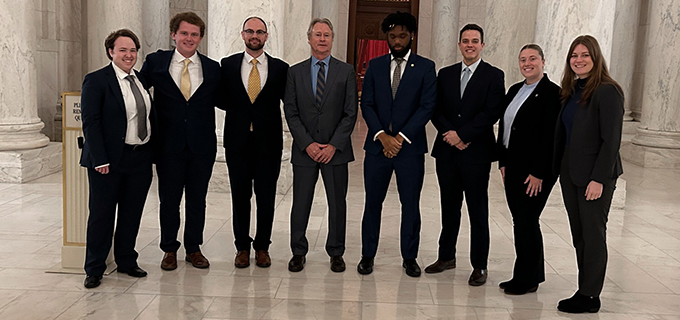
CIVIL RIGHTS APPELLATE CLINIC STUDENTS VISIT SUPREME COURT
January 2025 — Students in the Civil Rights Appellate Clinic at Penn State Dickinson Law in University Park recently travelled to Washington D.C. to observe Supreme Court oral arguments, tour the Supreme Court, and meet with Supreme Court Justice Ketanji Brown Jackson.
Accompanied by Clinic Director Michael Foreman, seven third-year students made the trip: Leah Benne, Noah Eastman, Seth Hojnacki, Colin McGee, Temidoyin Olusa, Hannah Shorkey, and Erika Uebelhor. They discussed Justice Jackson’s experience being the most recent justice confirmed to the Supreme Court, how cases are decided at the court, and how she approaches trying to persuade her colleagues.
Shorkey described the experience as “an honor” and believes all the students “left D.C. with a renewed sense of excitement and hope for the future, which we will carry forward into our legal careers.”
Hojnacki said, “Nothing reinvigorates your passion for the law quite like discussing it with a Supreme Court Justice,” and that he left Washington D.C., feeling “inspired.”
Prior to their discussion with Jackson, the students observed oral argument in two cases before the Supreme Court — Kousisis v. United States and Feliciano v. Dept. of Transportation.
In Kousisis, the question before the Supreme Court is whether deception to induce a commercial exchange can constitute mail or wire fraud even in circumstances where inflicting economic harm was not an objective of the alleged scheme, and more fundamentally what constitutes property under the mail fraud statute. The case stems from a prosecution and conviction of a company and its project manager who were contracted with the Pennsylvania Department of Transportation (PennDOT) to conduct bridge repairs in the Philadelphia area in which the company purported to spend some of the money from the contract on contractors who were disadvantaged business enterprises, but ultimately did not do so despite that being a requirement under the contract. The prosecution’s theory of “fraudulent inducement” is the central point of contention because the defendants argue that there is no harm because PennDOT received the full value of the bargain.
McGee expressed that viewing an oral argument in person was “wholly different to listening to it online, and watching how focused each Justice was during their colleagues’ questioning highlighted just how seriously the Justices take their job of defining what the law is.”
In Feliciano, the Supreme Court is tasked with answering whether a civilian employee who is called to duty during a national emergency is entitled to differential pay under federal law even if that duty is not directly connected to the national emergency. The case was brought by a Coast Guard reservist who argues he is entitled to differential pay for his service from 2012-2017 because the United States was under a national emergency stemming from 9/11. The argument largely turns on the definition of the word “during” as used in the statute requiring differential pay.
In describing his experience, Olusa said, “Despite the hundreds of SCOTUS cases I’ve read throughout my legal career thus far, there was something particularly moving about witnessing two oral arguments in-person. The Supreme Court became more than just some invisible omnipresent institution subtly guiding all of my work, and now the work I’m doing feels a bit more ‘real.’”
The Civil Rights Appellate Clinic provides intensive training in appellate advocacy by involving students in noncriminal civil rights cases before the state appellate courts, federal courts of appeal, and the U.S. Supreme Court. Students conduct research, draft briefs, assist in case selection, develop substantive legal positions and plan appellate strategy.